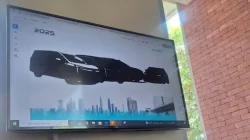Vietnam’s VinFast has committed a significant investment of Rp 4 trillion (approximately US$266 million) in Indonesia’s burgeoning electric vehicle (EV) sector. This substantial investment will facilitate the construction of a new EV manufacturing plant in Subang, West Java.
The Minister of Investment and Downstreaming, Rosan Roeslani, confirmed the investment during a press conference on March 11th, 2025, stating, “They are investing in electric cars in Subang on a 120-hectare site. They plan to produce 50,000 vehicles per year with that investment reaching Rp 4 trillion.”
This commitment was conveyed directly to President Prabowo Subianto by VinFast executives. Beyond the initial investment in the EV plant, VinFast has also expressed interest in exploring further investment opportunities within Indonesia’s energy sector. This suggests a long-term strategic vision for the company’s involvement in the Indonesian market.
VinFast’s Subang Plant: Production and Job Creation
Construction of the 50,000-unit-per-year EV plant in Subang is slated to commence shortly after Ramadan. The plant’s completion is targeted for 2026, with production expected to begin the same year.
VinFast plans to produce a diverse range of EV models, with price points ranging from Rp 200 million to Rp 600 million. This strategy aims to cater to a broad spectrum of Indonesian consumers.
The Indonesian government is actively supporting the project, aiming to streamline the construction process to ensure a smooth launch and maximize positive impacts on the local community. The project’s progress is currently reported to be proceeding smoothly.
The plant is projected to create between 1,000 and 3,000 direct jobs. This figure excludes the substantial indirect employment opportunities expected to arise in supporting industries including component supply, logistics, and infrastructure development.
The ambitious production target will significantly boost demand for skilled labor in manufacturing and technology, contributing to a positive reduction in national unemployment.
Beyond the Factory: Charging Infrastructure and Economic Impact
VinFast’s commitment extends beyond the Subang plant. The company intends to install a network of 30,000 to 100,000 charging stations throughout Indonesia. This substantial investment in charging infrastructure will further stimulate job creation within the renewable energy and EV support sectors.
The overall investment is expected to foster significant economic growth, create a more comprehensive automotive industry ecosystem, and boost Indonesia’s competitiveness in the global automotive market.
The presence of a major international player like VinFast will attract further investment from component suppliers and tier-1 and tier-2 vendors. This influx of investment will accelerate Indonesia’s transition towards electric mobility. Technology transfer from VinFast will also elevate the skills and capabilities of the local workforce.
State-owned enterprises (BUMN) Minister Erick Thohir highlighted the positive impact, stating, “This means it will open up job opportunities for the Indonesian people. This is extraordinary.” This reflects the broad-based expectation of significant economic benefits.
VinFast’s Broader Indonesian Strategy
VinFast’s commitment to Indonesia goes beyond vehicle manufacturing. The company has launched its Xanh SM electric taxi service in select locations across the country. This initiative signals a commitment to building a complete EV ecosystem, integrating transportation services alongside vehicle production.
The Indonesian government fully supports VinFast’s investment, viewing it as aligned with its national objectives of industrial downstreaming and attracting foreign investment. The government is actively assisting to expedite the plant’s construction.
This collaboration between VinFast and the Indonesian government is expected to significantly strengthen bilateral ties between Indonesia and Vietnam and boost economic cooperation in various sectors.
In conclusion, VinFast’s investment promises substantial positive impacts on Indonesia’s economy and environment. The company’s comprehensive approach, combining manufacturing, infrastructure development, and transportation services, demonstrates a strong commitment to supporting Indonesia’s sustainable development goals.






